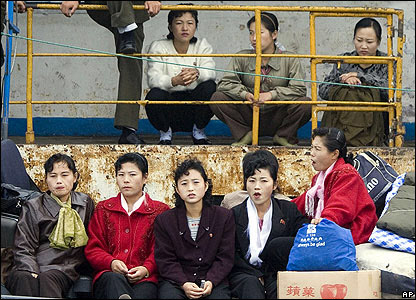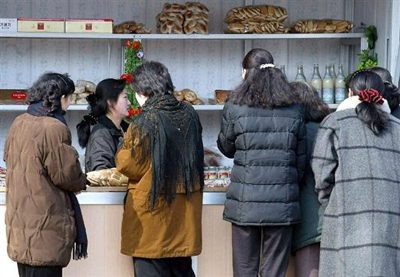북한 정권(North Korea‘s regime)은 최근 주민들의 장마당(시장) 단속을 벌이면서 여성들을 집중 대상으로 삼고(target women in a crackdown on private markets) 있으며, 여성들의 장마당 활동을 더 어렵게 하기 위해(to make it more difficult for women to engage in marketing activities) 바지를 입거나 자전거 타는 것을 금지하는 조치까지 취하고(have gone so far as to ban them from wearing pants or riding bicycles) 있는 것으로 드러났다.
지난주 유엔총회에 제출한 신랄한 보고서를 통해(in a scathing report to the UN General Assembly) 북한 인권상황이 ’지독히 열악하다‘고 비난했던(denounce human rights conditions in North Korea as ’abysmal‘) 비팃 문타폰(Vitit Muntarbhorn) 유엔 인권보고관(UN human rights rapporteur)은 “여성들의 곤궁함(plight of women)이 최근 몇 년간 갈수록 악화되고(get worse and worse during these years) 있다”고 밝혔다.
AFP통신에 따르면 문타폰 특별보고관은 26일 한국경제연구소(KEI·Korea Economic Institute) 강연을 통해 “북한 당국이 이처럼 또 다시 탄압을 가하고(do the clampdown again) 있는 것은 주민들에 대한 통제력을 잃을 것을 두려워하고(fear losing their grip on the population) 있기 때문”이라고 밝혔다. 북한 정권 입장에서는 주민들이 국가에 의존하게끔 하기를 원하는 데(want the population to be dependent on the state) 그런 역학이 무너지는 것에 위협감을 느끼고 있다는 얘기다.
북한은 장마당이 체제 유지에 위협 요소가 되자 49세 이하 여성들(women under the age of 49)이 (장마당) 거래에 관여하는 것을 금지시켰으며(prohibit them from engaging in trading), 그 때문에 젊은 여성들과 당국간의 충돌에 관한 보고들(reports of clashes between young women and authorities)이 수면 위로 떠오르고(have surfaced) 있다. 이는 국제 식량구호가 줄어들면서(with a decline in international food aid) 식량 부족이 심화되는 데 따른(as food shortages deepen) 해당 정책에 대한 갈등을 단적으로 보여주는(reflect tensions over the policy) 것이다.
그렇다면 왜 여성들일까. 남성들은 광산에서 일하는 등(such as working in the mines) 다른 일들을 하고 있는(be doing other things) 탓에 여성들이 수입에 있어 매우 활동적인 생성원이 되고(be very active generators of that income) 있기 때문이다.
그러나 젊은 여성들에게 (장마당) 거래를 허용하지 않는(do not allow them to trade) 것은 결국 활동적인 인력을 수입 창출 등으로부터 금지시키는(prohibit active people from generating income and the like) 결과를 초래, 상당한 파장을 불러일으키게 된 것이다.
태국의 법학교수(a Thai law professor)인 문타폰은 2004년 이래 북한의 인권상황에 대한 유엔의 특별보고관으로 근무(serve as the United Nation’s special rapporteur into human rights conditions in North Korea since 2004))해 왔다.
북한의 공산정권(North Korea‘s communist regime)은 1999년 소련 붕괴 이후(following the collapse of the Soviet Union in 1999) 장마당을 경험하고, 외국 식량원조를 받아들였으나(experiment with private markets and accept foreign food aid) 2005년 다시 단속을 하기 시작(begin to clamp down again in 2005)했다.
결국 북한은 최대 도매시장 폐쇄를 명령하게(order the closure of the country’s biggest wholesale market) 됐고, 현재는 농민시장 거래를 일부 식량품목으로 제한하면서(limiting trade to some food items in farmers markets) 주민들에게 국영 상점들에서 직접 곡물이나 다른 농산물을 구입하도록 강요하고(compel the population to obtain grain and other produce directly from state-run stores) 있다. 문타폰 보고관은 앞서 유엔 총회에 대한 보고에서 북한 정권이 올해 소규모 농작도 금지할(plan to prohibit small-patch farming this year) 계획이라고 공개한 바 있다.
한편 외부 식량구호(outside food aid)는 북한의 미사일과 지난 5월 핵실험의 결과로(in the wake of North Korea missile and a May 2009 nuclear test) 급격히 줄어들게 됐고, 세계식량계획(WFT)의 커버 범위는 당초 계획됐던 600만명에서 200만명 미만으로 줄이게끔 하고(force the World Food Program to reduce its coverage to less than two million people from a planned six million) 말았다.
문타폰은 이와 관련, “앞으로도 죽으로 연명하며(live on porridge), 풀을 뜯어먹고(eat grass), 또 다른 먹거리를 찾아 헤매는(forage for additional food) 영양실조의 북한 주민들에 대한 계속되는 보고들을 접할(get continual reports of undernourished North Korean people) 수 밖에 없을 것”이라고 강조했다.

